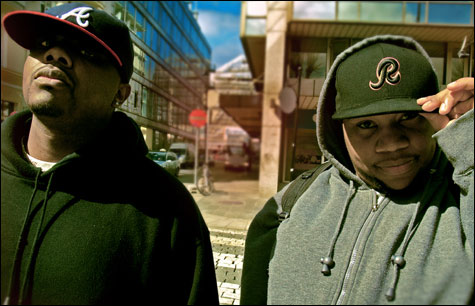
ENERGIZED: “I know it sounds like an ending/This is a beginning,” raps Pooh (right). |
More than KRS-One, more than Jay-Z, and more than Talib Kweli, Little Brother have become the embodiment of everything hip-hop purists think the genre should be — feel-good grooves, positivism, and a sound and vision that recall the Native Tongues day of De La Soul and A Tribe Called Quest. The Durham group’s heralded 2003 debut, The Listening (ABB), put a modern spin on those golden-era themes. And their major-label follow-up, The Minstrel Show (Atlantic), showed that MCs Big Pooh and Phonte weren’t afraid to offend the corporate suits with their anti-mainstream attitude.
On Getback (a return to ABB), it’s gotten personal. Although the new disc features Lil Wayne on “Breakin My Heart” and has its share of radio-friendly grooves, it focuses on Little Brother’s year of upheaval, which began after The Minstrel Show failed to sell and the group parted ways with Atlantic. They also lost 9th Wonder, the DJ and producer who’d helped sculpt their sound, even though he does show up to produce the Lil Wayne track. Elsewhere, Illmind and Khrysis handle the production without missing a beat.
“It’s been a year of liberation,” Pooh says via phone in the midst of a tour that brings Little Brother to the Paradise on December 3. “To most people it looked like a lot of things was collapsing in our careers, but that’s not the case. The whole Atlantic situation, we could see that coming for a while. The whole 9th situation, that was happening for a while too — it just looked like it happened abruptly. But that’s part of life. We just deal with the changes and keep it crackin.’ ”
9th Wonder’s mellow, Sunday-afternoon beats are missed on Getback, which dropped in October. But as MCs, Pooh and Phonte are in peak creative form, ruminating on their current career trajectory. “I know it sounds like an ending/This is a beginning,” Pooh raps on “When Everything Is New.” And, later: “It’s no longer fame I aspire to attain/’Cause fame is a drain when your morals get flushed.”
Although Pooh insists the Atlantic separation was by mutual agreement, it was certainly not amicable. He blames the label for failing to promote The Minstrel Show, a critique he extends to ABB, which also signed on with Atlantic. “It sucks, we still on somebody else’s label, still have to depend on somebody else. If you’re depending on somebody else, shit ain’t gonna get done the way we want it done.” He adds that Little Brother hope to liberate themselves by releasing future albums independently. “We done built up the Little Brother brand enough to be able to secure our own distribution deal and put out records like we want to put out records. If I wanted to, I could put a record out every week. Ain’t no red tape. And if my record fucks up, I know it fucked up because I fucked up.”